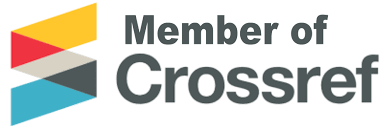Digital Financial Transactions Using QRIS Reviewed From The Legal Aspects
Abstract
One sector that is experiencing changes in the current digital era is the financial sector, where payment transactions are starting to be carried out through digital systems, some of which use the QRIS system. Payment transactions via QRIS can speed up transactions and reduce operational costs, especially for commercial players. However, the use of QRIS has clearly given rise to what is called digital crime, which can harm users (QRIS consumers) by destroying the QR code and "undoing" the actions carried out by the perpetrator. This research uses qualitative research with data collection techniques through library research which is analyzed qualitatively. The results of the first research concluded that legal protection for QRIS users based on current regulations includes PJSP having valid legal status, PJSP must create a financial innovation ecosystem with good digital credentials in the financial services sector and be registered with the Financial Services Authority. OJK and QRIS users (consumers) enjoy rights based on the provisions of the Consumer Protection Law and the ITE Law. Second, the legal consequences of misusing consumer data in digital transactions using QRIS make the perpetrator liable for professional misconduct. For losses incurred, QRIS users can file a civil lawsuit or compensation through PJSP, as stipulated in Article 12, paragraph 1, Law no. 27, 2022 on personal data protection.
Keywords
Full Text:
PDFReferences
Arianto, N., & Octavia, B. D. A. (2021). Pengaruh Kualitas Pelayanan dan Distribusi terhadap Keputusan Pembelian. Jurnal Disrupsi Bisnis, 4(2), 98–107.
Fauziyah, A. N., & Rochayatun, S. (2023). THE QUALITY OF INTERNAL AUDIT’S ROLE, GOOD CORPORATE GOVERNANCE, AND HIGH-QUALITY CORPORATE VALUE: A LITERATURE REVIEW. Proceedings of the International Conference of Islamic Economics and Business (ICONIES), 9(1), 243–252.
FIDYA, P. (2023). Pengaruh Literasi Keuangan Digital, Kebermanfaatan, dan Daya Tarik Produk Terhadap Penggunaan E-Wallet (DANA) Education Pada Masyarakat Desa Natar.
Fizriyani, W. (n.d.). 83 Persen Transaksi QRIS Didominasi Pelaku UMKM. Retrieved January 10, 2024, from https://ekonomi.republika.co.id/berita/rykauh502/83-persen-transaksi-qris-didominasi-pelaku-umkm
Gufran, M. I., Natsir, M., & Tajuddin, T. (2023). Determinan Tingkat Penggunaan Quick Response Indonesian Standard Di Kota Kendari. Value Added: Majalah Ekonomi Dan Bisnis, 19(2), 89–94.
LAPORAN AKHIR ANALISIS DAN EVALUASI HUKUM KEUANGAN DIGITAL. (2022). https://bphn.go.id/data/documents/2022_keuangan_digital.pdf
Nano, V. (2024). Modus Penipuan Pakai Kode QR di HP, Rekening Auto Ludes. https://www.cnbcindonesia.com/tech/20240203192826-37-511477/modus-penipuan-pakai-kode-qr-di-hp-rekening-auto-ludes
Nurohman, Y. A., Qurniawati, R. S., & Ahzar, F. A. (2022). Pembayaran Digital Sebagai Solusi Transaksi Di Masa Pandemi Covid 19: Studi Masyrakat Muslim Solo Raya. Among Makarti, 15(2).
Panjaitan, H. (2021). Hukum Perlindungan Konsumen. Jala Permata Aksara.
Pasca, K. T. T. (n.d.). Masa Depan Uang Digital di Indonesia.
Redaksi. (n.d.). Kelebihan dan Kekurangan QRIS Beserta Cara Membuatnya, Pelaku UMKM Wajib Tahu! Retrieved January 15, 2024, from https://voi.id/teknologi/265327/kelebihan-dan-kekurangan-qris
Rumlus, M. H., & Hartadi, H. (2020). Kebijakan penanggulangan pencurian data pribadi dalam media elektronik. Jurnal Ham, 11(2), 285–299.
Saraswati, A. (2023). Peta Persaingan Bank Menuju Digital.
Sinaga, I. S. A., Yusrizal, Y., & Rahmadani, S. (2023). Analisis Manajemen Resiko Penggunaan Digital Payment:(Studi Kasus Pada PT. Bank Syariah Indonesia, Tbk KC Medan S. Parman). JIKEM: Jurnal Ilmu Komputer, Ekonomi Dan Manajemen, 3(1), 647–685.
Telkom, I. (2022). Service Centre QRIS Satu QR Code untuk Semua Payment. https://qris.id/homepage/qris-service-center.
DOI: https://doi.org/10.35314/inovbiz.v12i2.4020
Refbacks
- There are currently no refbacks.
Copyright (c) 2024 Fridayani Wongsowinoto, BENNY CUACA, BENNY CUACA

This work is licensed under a Creative Commons Attribution-NonCommercial-ShareAlike 4.0 International License.
This Journal has been listed and indexed in :
Copyright of Jurnal Inovasi Bisnis (p-ISSN : 2338-4840, e-ISSN : 2614-6983)

Inovbiz: Jurnal Inovasi Bisnis is licensed under a Creative Commons Attribution-NonCommercial-ShareAlike 4.0 International License.
Editorial Office :
Pusat Penelitian dan Pengabdian kepada Masyarakat
 Politeknik Negeri BengkalisÂ
Jl. Bathin alam, Sungai Alam Bengkalis-Riau 28711Â
E-mail: inovbiz@polbeng.ac.id














